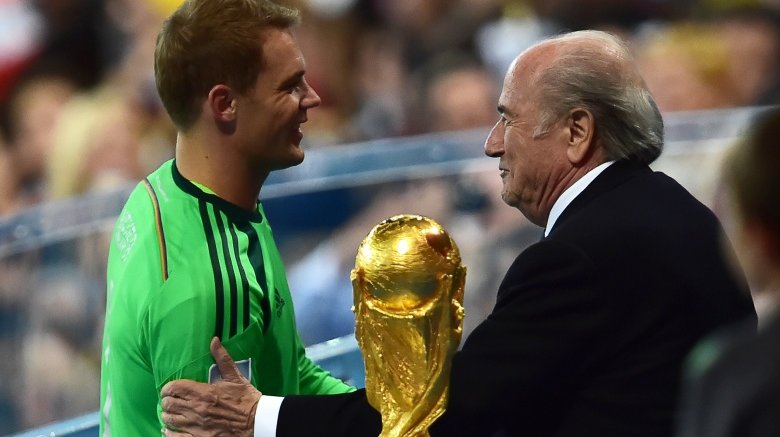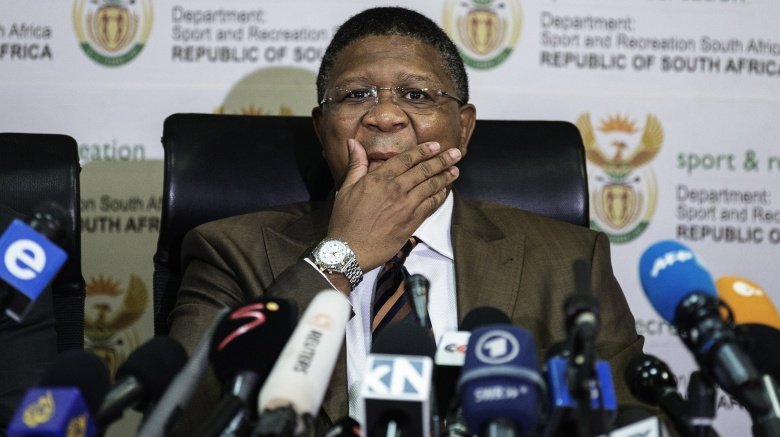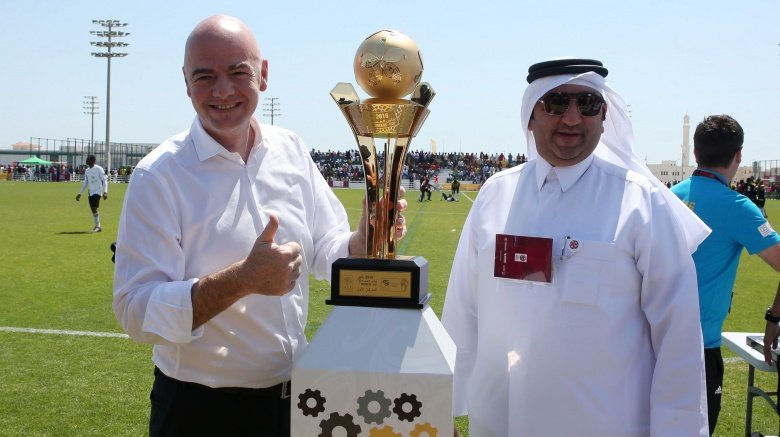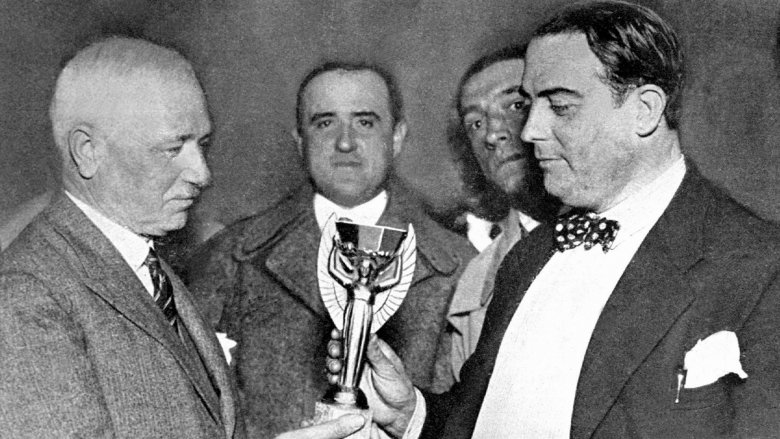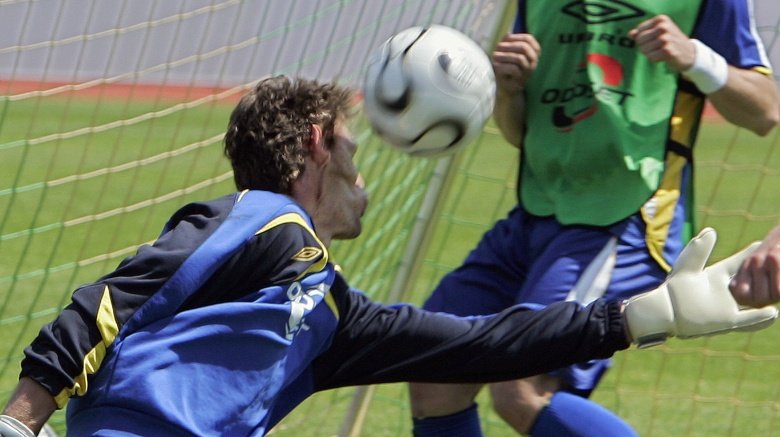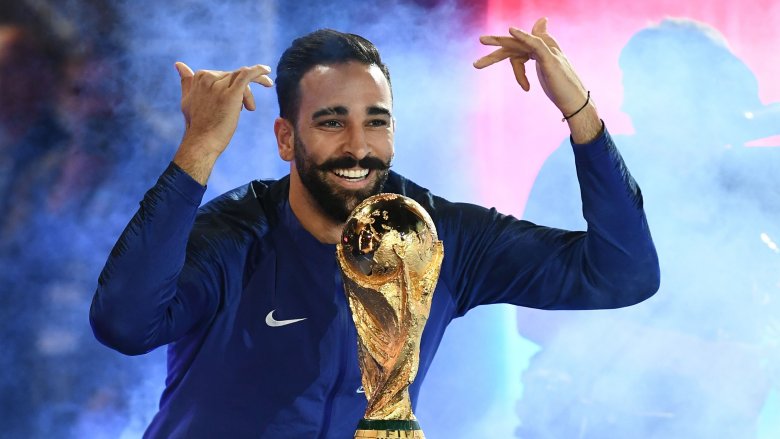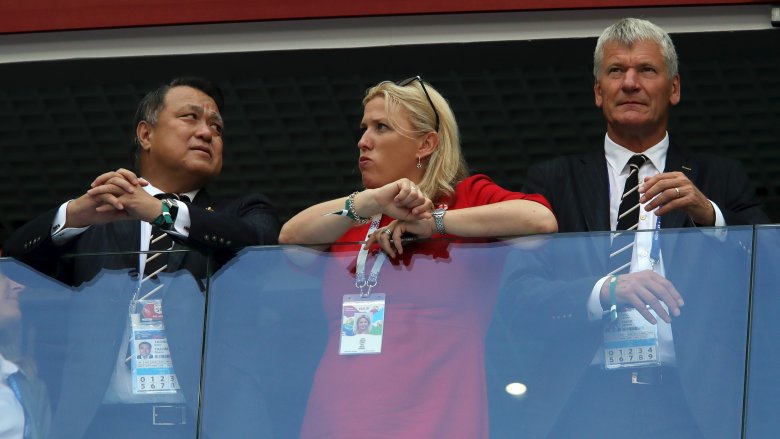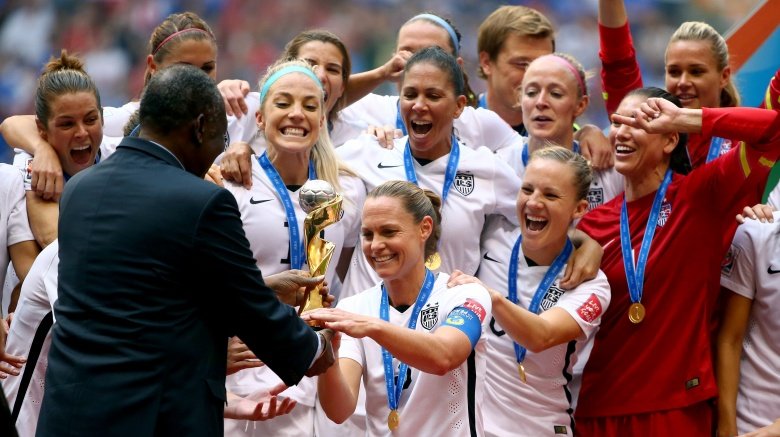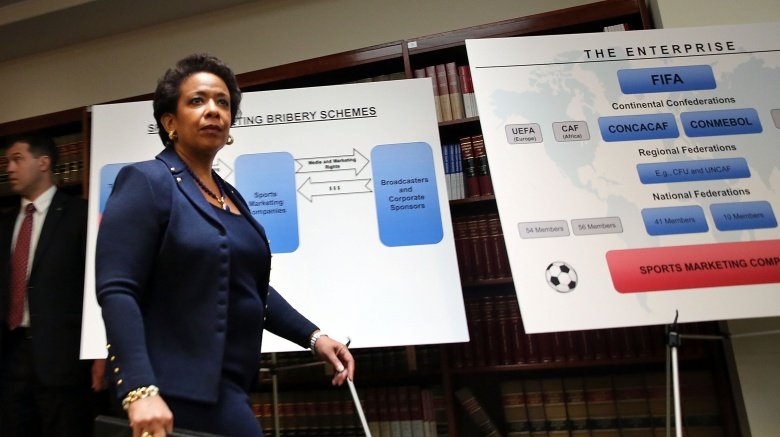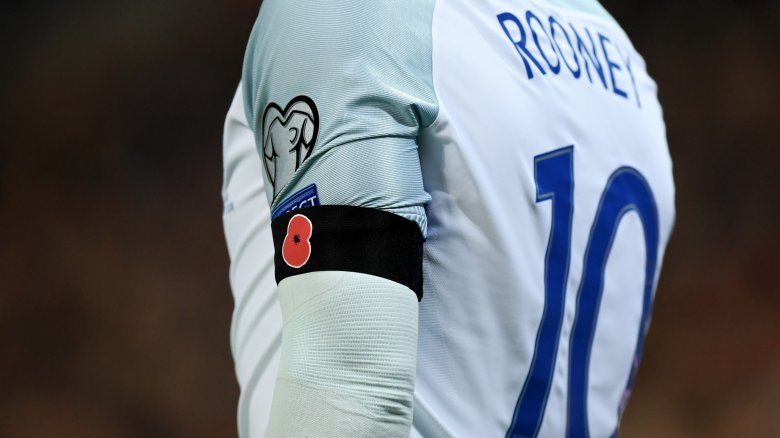The Untold Truth Of FIFA
If you're a sports fan in the 21st century, there's a pretty good chance that one of your favorite sports is soccer. Sure, that might make some red-blooded, apple pie-chomping Americans roll their eyes, but it's just a fact that soccer is quickly becoming one of the most popular sports in the country. But the name FIFA actually has very different associations for the rest of the world: things like corruption, human rights violations, and even death. It's easy to make a case for the beautiful game. But there's a lot going on behind the scenes that you might not know about. Here's the untold truth of FIFA.
Bribery and vote rigging
Over the past decade, FIFA (or Fédération Internationale de Football Association) officials have been involved in so many bribery scandals it's almost impossible to know where one starts and the next ends. It's almost expected at this point that everyone involved at the highest levels of FIFA is taking bribes or asking for bribes. And not just for money; FIFA officials have asked for everything up to and including a knighthood as part of their efforts to line their own pockets.
Just how brazen is FIFA when it comes to bribery? In 2016, FIFA admitted publicly that the votes to award the World Cups in 1998 and 2010 were both rigged, with voters accepting massive bribes. But far from being repentant, FIFA actually claimed to be the victim, saying its members defrauded the organization by accepting bribes. Therefore FIFA wanted to be recouped for the losses they claimed their own corruption cost them! Seriously, you cannot make this stuff up.
The deadly human cost of Qatar
One of FIFA's biggest scandals has been their handling of the 2022 World Cup, which was inexplicably awarded to the desert nation of Qatar. Of course, there's a perfectly reasonable explanation why FIFA would agree to stage the World Cup, which is traditionally held in the summer, in a country where summer temperatures can reach over 120 degrees. You guessed it: bribes.
But while the danger posed to players and fans by heat exhaustion is very real, it pales in comparison to the dangers faced by the thousands of migrant workers being employed by Qatar to construct the World Cup stadiums. According to many reports, workers are essentially treated like slaves, with cramped and overcrowded living conditions, terrible food and pay, and a complete disregard for safety in the workplace. Just how many workers have already been killed building World Cup venues is impossible to know, since Qatar refuses to tell us. But some organizations have estimated that upwards of 4,000 workers will die before the World Cup is staged in 2022. That's unconscionable.
Ticket scalping and match fixing
FIFA's institutional corruption might begin with bribery and vote rigging, but it certainly doesn't end there. If there's money to be had — the 2014 World Cup generated nearly $5 billion in revenues — FIFA officials will figure out some way to take it. Legality very much optional.
For example, one official involved with the 2014 World Cup in Brazil was arrested for a ticket scalping scheme where he funneled high-value tickets directly into the hands of scalpers, who then resold them for astronomical markups. It's estimated that single scheme alone topped $100 million. And for lower-level officials who don't have that kind of inside connection? Well, there's always match fixing, like the case of Wilson Perumal, who admitted to rigging the outcome of dozens of matches over the course of two decades. "If FIFA really wanted to do something, they could," Perumal said.
How FIFA found its footing
Long before the Fédération Internationale de Football Association, there was the Football Association, which set itself up to regular soccer in England. A similar organization, the Royal Dutch Football Association, started up in the Netherlands in 1889, and not too long after, the group's secretary, Carl Anton Wilhelm Hirschman, contacted the Football Association in the U.K. with a proposal to start an international soccer body. The English reps were interested but had to wait for approval from Scotland, Wales, and Ireland before they could sign on.
Meanwhile, French football head Robert Guérin heard about Hirschman's plan and wanted in, but he got so tired of waiting on the Brits that he pushed through a plan to start an international soccer agency among continental European teams. He wrote to them all, and the idea was a major topic of off-field discussion at what FIFA now considers the first official international match — on May 1, 1904, the Belgian national team played the French national team in Brussels. By that point, the Britons had finally passed, and so three weeks later, representatives of seven nations (France, Belgium, Denmark, the Netherlands, Switzerland, Spain, and Sweden) met in Paris to sign the first FIFA charter.
Today, FIFA encompasses a lot more than seven countries. As of 2018, the organization boasts 211 member nations spanning six geographic-based confederations.
Doping and concussions
FIFA's issues aren't confined to front office corruption, though. They also have some serious problems regarding player safety, both in the form of performance enhancing drugs and concussions. That's right: Futbol has just as many concerns as football when it comes to head injuries, considering players intentionally and repeatedly use their heads as part of the sport and wear no protective gear.
So what has FIFA done to address concerns around player safety? Not much. After a player in the 2014 World Cup final had to leave the pitch due to a severe concussion, FIFA finally implemented the most basic of concussion protocols, with a doctor now at least checking to see if the player is injured. That might be considered progress if this were 1916 and not 2016. Maybe.
And their anti-doping policies are also woefully behind the times. In fact, no player has tested positive for any kind of performance-enhancing substance at the World Cup since 1994. FIFA would have you believe this is due to how ridiculously clean the sport is, but given the state of literally every other major sport in the world, it's hard to imagine soccer players are just that much more noble than other athletes.
FIFA: They're more than just the World Cup
In much the same way that another organization shrouded in secrecy, the Secret Service, does lots of things but is only widely known for one task (keeping people from shooting the president of the United States), FIFA isn't just an organization that puts on the World Cup every four years. Although if they did, that would be enough because it's a major undertaking that takes a very long time to plan.
But the World Cup is FIFA's marquee event, both in terms of attention and fundraising. According to the organization, 93 percent of the board's income is derived from World Cup events. That, in turn, finances FIFA's other activities. Those include other major tournaments around the world, and contributions to more than 200 charities, not to mention the promotion of soccer in the developing world (like building fields and donating balls, cleats, etc.).
FIFA isn't just the international governing body of soccer, or football if you're not an American. FIFA also sets the worldwide rules for two variants of the game: indoor soccer (or futsal) and beach soccer (which sounds extremely difficult).
It's good to be a council member
There are always benefits to being a member of any exclusive club, and that's definitely true for those 36 bigwigs and executives lucky enough to sit on the FIFA Council. Even after that earth-shattering corruption scandal metaphorically slide-tackled the world of soccer (and FIFA itself) in 2015, it's still lucrative and luxurious to run in FIFA's highest echelons.
At the 2018 World Cup in Russia, council members lodged at Moscow's Lotte Hotel, one of the nicest places to stay on the continent (which also set up a private and luxurious "FIFA Club" for its honored guests). They would also attend as many matches throughout the country as they wanted, with a fleet of cars waiting to whisk them to the airport for a private charter flight to reach the next game in time, where they could watch the action while sipping champagne in a luxury stadium suite. Most costs of living in Russia went on FIFA's dime, too, although council members still received a $150 per diem. In exchange for all that, FIFA Council members had to attend just three meetings in 2018. Oh, and each took home a salary of $250,000 for their "trouble."
Institutionalized sexism and racism
You're probably thinking that FIFA might be a bunch of corrupt politicians skimming money from the sport with no regard to the human consequences either on or off the pitch. But at least they aren't racist and sexist! Oh, wait.
Let's start with this: At the 2014 World Cup, the director of FIFA's own anti-racism task force lambasted FIFA for failing to address racism. That's like the pot calling the kettle out for wearing blackface ... which, in fact, was exactly what he was doing after FIFA failed to bring any disciplinary action against a group of fans who attended a game wearing blackface. "We at FIFA and the local organizing committee should be doing a much better job," Jeffrey Webb said.
You know who else should have been doing a better job? Former FIFA President Sepp Blatter, who set back the progress of women's soccer around the world a decade or more every time he opened his mouth. "Let the women play in more feminine clothes like they do in volleyball," he once helpfully suggested. "They could, for example, have tighter shorts. Female players are pretty, if you excuse me for saying so, and they already have some different rules to men — such as playing with a lighter ball. That decision was taken to create a more female aesthetic, so why not do it in fashion?" Oh, and the payout for winning the 2015 Women's World Cup? $2 million, compared to $38 million for the 2018 Men's World Cup.
The U.S. Department of Justice dropped the hammer
Things actually got so bad with FIFA that the United States government finally decided enough was enough and dropped the ban hammer on the whole corrupt viper pit. In 2015, in a series of raids conducted in unison with the government of Switzerland, the U.S. Justice Department arrested and brought charges against 16 senior FIFA officials. FIFA swore to clean up their act, ousting President Sepp Blatter after nearly 18 years. But since nobody really believes anything FIFA says, the Department of Justice pressed forward while also aiding the Swiss in their investigation of the 2018 and 2022 World Cup votes, which were both alleged to have been fixed. Big surprise. Several officials were convicted in 2017. Only time will tell if anything changes.
FIFA doesn't like it when you honor the dead
In the U.K. (England, Scotland, Wales, and Northern Ireland) and in independent nations that are members of the British Commonwealth (such as Canada), citizens somberly observe Remembrance Day each November. Akin to the American holiday of Veterans Day, Remembrance Day is marked with military parades and solemn contemplation as a way to honor those who died in wars. (It began as a commemoration of the end of World War I.) Throughout the British and British-influenced realm, lots of people symbolically wear red-and-black poppies on their clothes on Remembrance Day, and in 2016, the English and Scottish national soccer teams were both fined by FIFA because players wore armbands depicting poppies. That violates an association rule against displaying "political symbols." Apparently remembering and showing thanks to the war dead for paying the ultimate sacrifice is "too political" for FIFA, at a cost of $44,000 in fines to the English side and $19,500 to the Scottish squad.
